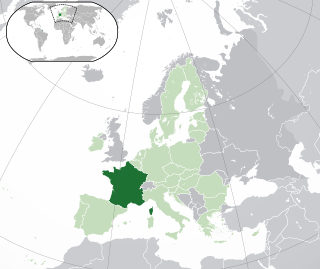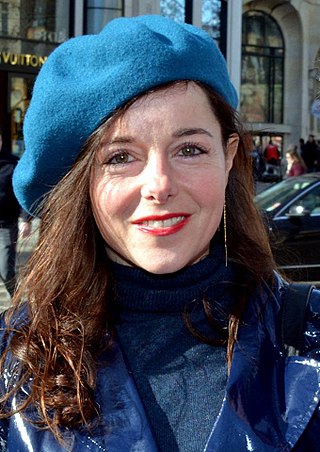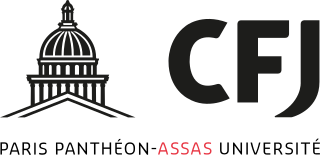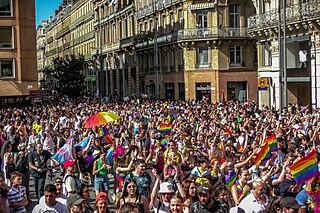Related Research Articles

Lesbian, gay, bisexual, and transgender (LGBT) rights in France are some of the most progressive by world standards. Although same-sex sexual activity was a capital crime that often resulted in the death penalty during the Ancien Régime, all sodomy laws were repealed in 1791 during the French Revolution. However, a lesser-known indecent exposure law that often targeted LGBT people was introduced in 1960, before being repealed in 1980.

Lesbian, gay, bisexual, and transgender (LGBT) people in Luxembourg have the same legal rights as non-LGBT people. Partnerships, which grant many of the benefits of marriage, have been recognised since 2004. In June 2014, the Luxembourgish Parliament passed a law enabling same-sex marriage and adoption rights, which took effect on 1 January 2015. Additionally, discrimination on the basis of sexual orientation and "change of sex" in employment, healthcare and the provision of goods and services is outlawed, and transgender people are allowed to change their legal gender on the basis of self-determination.

Cyril Valéry Isaac Hanouna is a French radio and television presenter, writer, author, columnist, producer, singer and occasional actor and comedian of Tunisian origin. He hosts the French TV show Touche pas à mon poste.
Visa pour l'Image is an international photojournalism festival established in 1989, which takes place annually in the entire city of Perpignan, France. This is the main and most important festival of photojournalism in France and runs from late August to mid-September for a period of 15 days.

Touche pas à mon poste! (TPMP), literally "Don't Touch My TV Set!", is a French live television talk show. It is broadcast on C8 and produced by H2O Productions. The show, hosted by Cyril Hanouna, deals with media news; it is broadcast from Monday to Friday at 8:30 p.m.

Civitas, also known as France Jeunesse Civitas and Institut Civitas, was an association generally considered to be Traditionalist Catholic, integrist, nationalist, and of the extreme right. The association defines itself as a "Traditionalist Catholic lobby group". The group was once associated with the Society of St. Pius X, but it has evolved under the new leadership of Alain Escada and the "chaplaincy" is now provided by Capuchin Friars of Morgon. On February 14, 2023, the Global Project Against Hate and Extremism (GPAHE) released a report in which it classified Civitas as a "religious nationalist", "anti-LGBTQ+", and "conspiracy" group.

Laure Calamy is a César Award-winning French film, TV and theatre actress best known for her roles in Call My Agent! and My Donkey, My Lover & I.

Night prides are protest demonstrations of LGBTI people alternative to the Pride marches, which are considered depoliticized.
Mounir Baatour is a Tunisian lawyer and LGBT activist. He is the founder of the LGBT organisation Association Shams, leader of the Tunisian Liberal Party, and was the first openly gay presidential candidate in the Arab world.
Henri Tincq was a French journalist and Vatican expert.

Lorena Parini is a Swiss political scientist and gender studies scholar. She is a professor at the University of Geneva. She studies gender and politics, political discrimination against LGBT people, and the role and construction of social identities.

The Centre de formation des journalistes or CFJ Graduate School of Journalism is a private non-profit Grande École and the Paris-Panthéon-Assas University graduate school of journalism, as part of a public-private partnership, located in Paris and Lyon, France.
InterAction is a Swiss organization for intersex people, parents, friends and allies to educate, provide peer support and address human rights issues.
The Collectif intersexe activiste - OII France, until 2022 known as the Collectif intersexes et allié.e.s, abbreviated to CIA-OII France, is a not-for-profit association founded in 2016 by Loé Petit and Lysandre Nury. It aims to defend and support intersex people.

The Syndicat de la famille, better known under its original name of La Manif pour tous (LMPT), is a nonprofit organization and political movement based in France which is responsible for most of the anti-gender and anti-LGBT demonstrations and actions that took place between 2012 and 2013, in opposition to the legalization of same-sex marriage in France, as well as against the adoption of children by same-sex couples in France.
William Buzy is a French writer born in 1989 and based in Liverpool.

Caroline Dayer is a Swiss feminist researcher, educator and writer specializing in gender studies. She is known for her engagement in LGBT rights and makes regular interventions as an expert in the media in Switzerland on issues like homophobia, sexism and street harassment.

The Toulouse Pride is a parade taking place every year since 1994, in the French city of Toulouse.

Thaïs d'Escufon, born August 28, 1999 in Toulouse, is a French far right activist. She was spokesperson of Génération identitaire from 2018 to its dissolution by the French government in 2021.

Christine Eugénie Kelly, in Lamentin (Guadeloupe), is a French radio and TV presenter, journalist, and writer.
References
- ↑ Fabien Jannic-Cherbonnel (21 May 2017). "Is media treatment of LGBT issues equal and fair?". RFI.
- ↑ Le Collectif pour la création d’une Association des journalistes LgBT (16 May 2013). "Pour une association des journalistes LGBT". Libération (in French).
- 1 2 Hélaine Lefrançois (24 June 2014). "Une association de journalistes sort un kit pour parler des LGBT "avec justesse"". L'Express (in French).
- ↑ Maëlle Le Corre (5 March 2014). "Ce soir à la télé: le journal télévisé de TV5 Monde+ Afrique s'intéresse à l'homosexualité". Yagg (in French).
- ↑ AJL (13 October 2016). "Transphobie dans les médias : fini de rire !". Pure Médias (in French).
- ↑ Romain Cheyron (5 October 2016). ""Le Grand Journal" : nouveau malaise après les blagues sexistes et homophobes de l'humoriste Lamine Lezghad". LCI (in French).
- ↑ "Pourquoi les médias ont-ils si peur de l'"homophobie" ?" (in French). 30 June 2016..
- ↑ Prenons la une et l’Association des journalistes LGBT (14 February 2019). "" La Ligue du LOL n'a rien d'une exception "". Le Monde (in French).
- ↑ Virginie Ballet (3 March 2017). "Elle et "Louis(e)"". Libération (in French). Archived from the original on 18 June 2017. Retrieved 22 January 2020.
- ↑ "Discrimination, prejudice and the role of social media in the age of gay marriage". media.journalismfestival.com. 19 April 2015.
- ↑ "L'AJL au Festival international du Journalisme de Pérouse". ajlgbt.info (in French). 26 April 2015. Retrieved 31 May 2017.
- ↑ "Des rédactions à l'image de la société ?". journalisme.com/ (in French). 9 March 2016. Archived from the original on 10 September 2017. Retrieved 30 May 2017.
- ↑ Lauriane Sandrini (9 March 2016). "4 questions à Florian Bardou". Les Assises du Journalisme 2016 (in French)..
- ↑ "Alice Coffin". Le Huffington Post. Archived from the original on 25 January 2018. Retrieved 12 November 2017.
- ↑ Lesage, Nelly (17 May 2017). "L'Association des journalistes LGBT prépare sa cérémonie des " Out d'Or " - Pop culture - Numerama". Numerama (in French). Retrieved 12 November 2017.
- ↑ RTL et AFP (2 February 2014). "Manif pour tous du 2 février : de 80.000 à 500.000 manifestants à Paris". RTL.
- ↑ Alexandre Piquard (30 January 2014). "Manif pour tous : les "conseils" de l'association des journalistes LGBT". Medialand sur le Monde (in French). Archived from the original on 9 June 2017. Retrieved 22 January 2020..
- ↑ "OÜI FM, signataire de la charte "Médias contre l'homophobie"" (in French). 15 May 2015.
- ↑ Léa Baron et Sylvie Braibant (23 November 2016). "#25novembre : mettre les mots justes sur les violences faites aux femmes". TV5 Monde (in French)..
- ↑ ""Des quotidiens, des radios et des sites signent une charte contre l'homophobie"" (in French). 14 May 2015.
- ↑ Clio Weickert (14 December 2016). """ Touche pas à mon poste " : Cyril Hanouna " est un obsédé de l'homosexualité " selon l'Association des journalistes LGBT"". 20 Minutes (in French).
- ↑ "Homophobie. Une association LGBT épingle "Touche pas à mon poste "". ouest-france.fr. 14 December 2016. Retrieved 29 May 2017.
- ↑ Sam Damshenas (21 May 2017). "French presenter humiliates gay men live on TV with fake online profile". Gay Times. Archived from the original on 30 October 2018. Retrieved 22 January 2020..
- ↑ Jordan Grevet (5 January 2017). "Comment "TPMP" cherche à calmer les accusations d'homophobie". Closer (in French).
- ↑ Clea Broadhurst (28 May 2017). "Cyril Hanouna's prank distressing LGBT community". RFI.
- ↑ "TPMP, chronique quotidienne de l'homophobie ordinaire". BuzzFeed (in French). 19 May 2017.
- ↑ Yassine El Azzaz (20 December 2017). "L'Association des journalistes LGBT traque les propos discriminatoires dans les talk-shows". Le Monde (in French).
- ↑ Thierry Wojciak (20 December 2017). "L'AJL pointe le sexisme, l'homophobie et le racisme dans 5 émissions TV". CBS News (in French).
- ↑ Europe 1 avec AFP (20 December 2017). "Les journalistes LGBT dénoncent "un mois de sexisme, d'homophobie et de racisme" à la télévision". Europe 1 (in French).
{{cite journal}}: CS1 maint: numeric names: authors list (link) - ↑ Jordan Grevet (20 December 2017). "De Salut les Terriens à Quotidien, un mois d'homophobie et de sexisme ordinaire à la télé". Télé Star (in French).